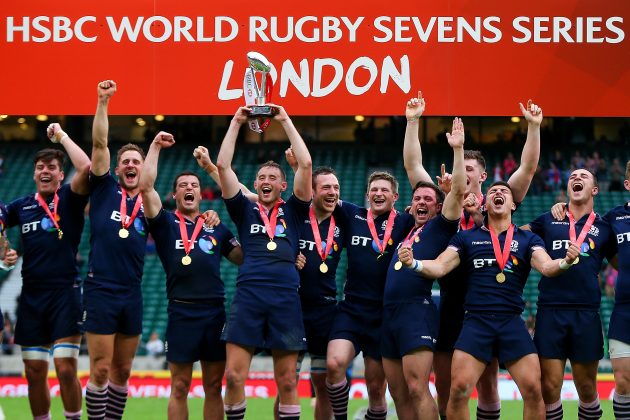With less than 20 seconds to go it seemed all too impossible: Scotland had to snaffle the kick-off, hold on to it without drawing the ire of the referee, break down a Blitzbokke side who had impressed all season long, and cross the line again, all to win their first ever HSBC Sevens World Series title, in London. It looked bloody hard, but then this is a side who know a thing or two about toughing it out.
This time last year Scotland sevens were facing extinction. Players were strung along with promises of meetings and negotiations as wrangling continued over what guise, if any, the team would come in the next season. Behind closed doors many of the athletes felt under-valued by their own union, with only one member of the playing squad contracted beyond that off-season. They suspected the programme they had toiled to keep afloat was being forced under.
With that going on off the field, Scotland finished the series in seventh place, their highest ever finish.
This posed a problem. As the clamour increased, as more and more within the game called for a stay of execution and board members were switched on to the ‘situation’ with the sevens programme, money had to be factored into provisional budgets for the next year. A compromise of sorts had to be decided upon, with a small core of seven full-time, experienced sevens specialists contracted for another single year, with the group supplemented by youngsters and players on the fringes of the two pro 15s sides. They lost some support staff and vastly experienced athletes like Colin Gregor – third on the list of all-time point-scorers on the HSBC Sevens World Series and a man synonymous with the game north of the border – had to step away from the programme, all too sadly.
From that point, the group could not come together as a single sevens squad until November. Being generous, one saving grace was that some of the senior sevens players have strong coaching backgrounds. At least they knew how best to look after themselves…

Try time: Jamie Farndale dives over for one of five Scotland sevens tries in the final
A legitimate piece of good news is that those same core sevens players have been offered another one-year contract, although negotioations are ongoing. Much like last season, the players were promised they would know their fate early – in this case they were told they would know by April – but again there were delays and offers were not formalized until the second week of May, during a time when athletes would be anxiously considering other avenues.
However, the last thing these professionals would want is a line of “boo-hoo, don’t we have it rough?” In a season of unpredictability on the series – before London, five different sides had won titles, including Kenya winning a first one in Singapore – every tournament could be different. It has been a series where teams have chopped and changed, trying to bring athletes from other disciplines up to speed, which is a task that has proved much harder than many assumed. While the party line in Scotland during all of this is that sevens is for developing 15s in Scotland, they have not had too many complete shake-ups and the squad have believed with every passing game that they are a competitive force. Indeed, next season a few players who were not slated to be part of the core of full-time sevens players, in contractual terms, should be offered the chance to be on sevens and sevens only next season. The SRU could do worse than extend offers to Nick McLennan and Dougie Fife – although the former may well have offers elsewhere.
The reason for that become brightly evident as the clock stopped in London. Having just scored against South Africa, Fife found himself with the ball again. A big angry zero sat at the top left hand of viewers screens, with the next stoppage halting the final. Catching a pass from left to right, Fife turned one way, then the other, made a crescent run for the gap and plunged for the line to wrestle a 27-26 win off the Boks. Disbelief, relief and elation all jostled for a place on his face. He and they had done what looked impossible only seconds before.
Now all the hopping and hollering is over, talk will drift past Scotland’s first ever series title, and we may even forget about that score from a driving maul… Everyone will now focus on Team GB. Five of the extended squad for Rio are Scots. Realistically these players have until the Exeter leg of the European Grand Prix sevens events, over 9 and 10 July, to snatch a place in the 12 for the Olympics. Another big challenge.
But before all of that you must appreciate exactly what the win meant for all involved with Scotland sevens. It is another season in which they have stepped back from the brink, past several obstacles – only this time they have brought a trophy with them.






